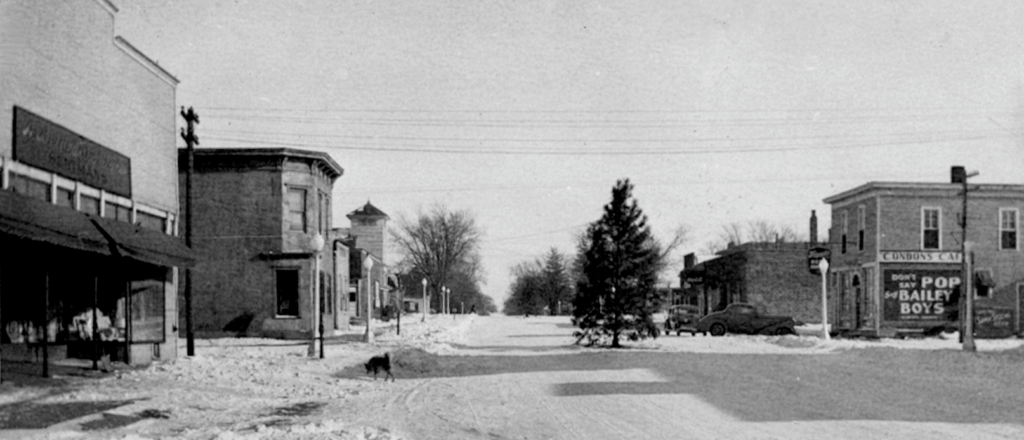
SRHS
Steamboat Rock Historical Society
NEW BEGINNINGS
RAINSBARGERS FREED
“After being imprisoned for 28 years, the last 25 in the Anamosa penitentiary, Frank and Nate stepped into the light of freedom on August 25, 1915. Nathan was then 62 years of age and Frank 55. By then they were Iowa’s oldest inmates.”
“They had evinced a remarkable prison record. Warden Barr bid. them “God speed and goodbye” when they left and was quoted as saying, “I am convinced that the Rainsbargers were not guilty of the crime for which they were convicted, or at least it was never proved against them. They have always been industrious, obedient and uncomplaining. They have ever had the respect and good will of officers and guards.”
“Adjustment to their newfound freedom was difficult. It seemed wherever the two brothers went, they encountered the curious and were conscious of their questioning looks and whispers. Frank and Nate would discuss the murder and their imprisonment with very few. “We talked about it among ourselves; just our folks and some good friends knew what we thought about it,” Nate said.”
“Not long after their release, they parted ways. Nate obtained a job in Marshalltown working as the building elevator operator for a large wholesale grocery company. He made many friends and acquaintances who spoke highly of his character and integrity. He was never married.”
“Frank found coping with his new way of fife quite difficult. Nettie had obtained a divorce while he was in prison. After his release he lived with a nephew and found employment as a day laborer.”
“When Frank later married Laura Cox from Des Moines, Iowa, he purchased a two-acre tract in Abbott and persuaded Nate to come and live there, too. It was here Frank died November 15, 1926.”
“Nate lived his last days quietly in Marshalltown where he died in 1940 at the age of 88.”
“The whole scenario of the Rainsbarger era is not unlike an old Western movie with the “good guys” and the “bad guys,” sometimes not knowing which was which.”
“Hardin County, Iowa, had long been besieged by groups of organized criminals, such as the counterfeiters and horse thief gangs led by the Bunker family and the shrewd Jack Reed. The public responded by forming vigilance committees and anti-horse thief associations. This type of raw justice was not uncommon as the land began to gain law and order. The Bunker family was eventually forced to leave the area. Although Jack Reed eluded arrest for some time, he was finally caught in 1887 charged with stealing a horse.”
“All along Frank and Nate had been realistic about the possible outcome of their trials. They recognized the mood of the people and the undercurrent of hostility directed toward their family. Lawyers for the prosecution had a relatively easy time. Their presentation of circumstantial evidence, suggestive questioning of witnesses, the discrediting of witnesses for the defense along with the perjury of Nettie easily brought the expected verdict of guilty. People seemed to accept that possibility very early because emotions ran high. The citizenry had been stirred to a frenzy by the bad mouthing of the vigilantes and the press, not to mention the effect the lynching had. So Frank and Nate submissively made the trip to prison and for 25 years daily pondered and puzzled over just what had happened.”

“About this time the new frontier of northwest Iowa and beyond gained a number of settlers from Hardin County. Feelings of fear and embarrassment caused one member of the Rainsbarger family to move to Minnesota never mentioning the black days of their Iowa residency to their children. It was nearly one hundred years later when their descendants began searching for family roots that the truth was uncovered.”
“Another connected family consisting of parents and two married sons who had all been firmly ensconced on Hardin and Grundy county farms pulled up and began anew in the Cherokee, Iowa area. Northwest United States was chosen by one family who even changed the spelling of their name.”
“How were the family and community affected? As one decade passed another perhaps nowhere in the country were there more carefully guarded secrets. Who would want to admit that one of their family was a member of the vigilantes and had a part in taking the life of another person? And would it benefit anyone’s selfesteem to volunteer that their grandparent was a Rainsbarger with all the connotations of that name? Though some opinions may have been, “they got what they deserved,” others felt they were scapegoats. The most common tightlipped comment whenever the subject came up was, “The Rainsbargers weren’t guilty of half of the crimes they were accused of.” But the stigma remained.”
© 2020 Steamboat Rock Historical Society | All Rights Reserved
Powered by Hawth Productions, LLC